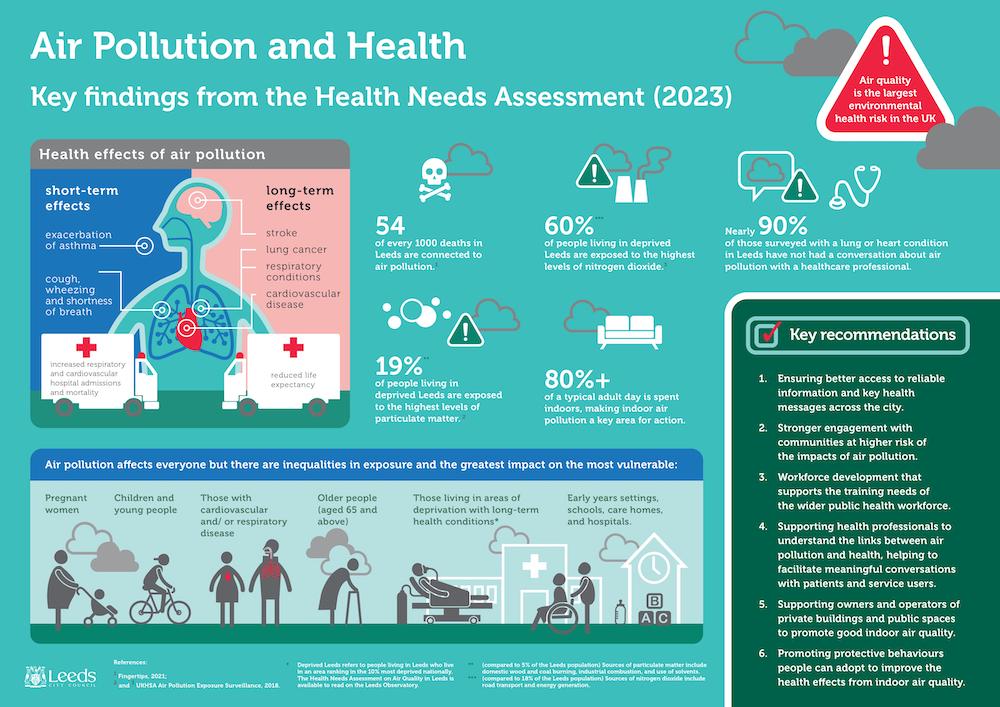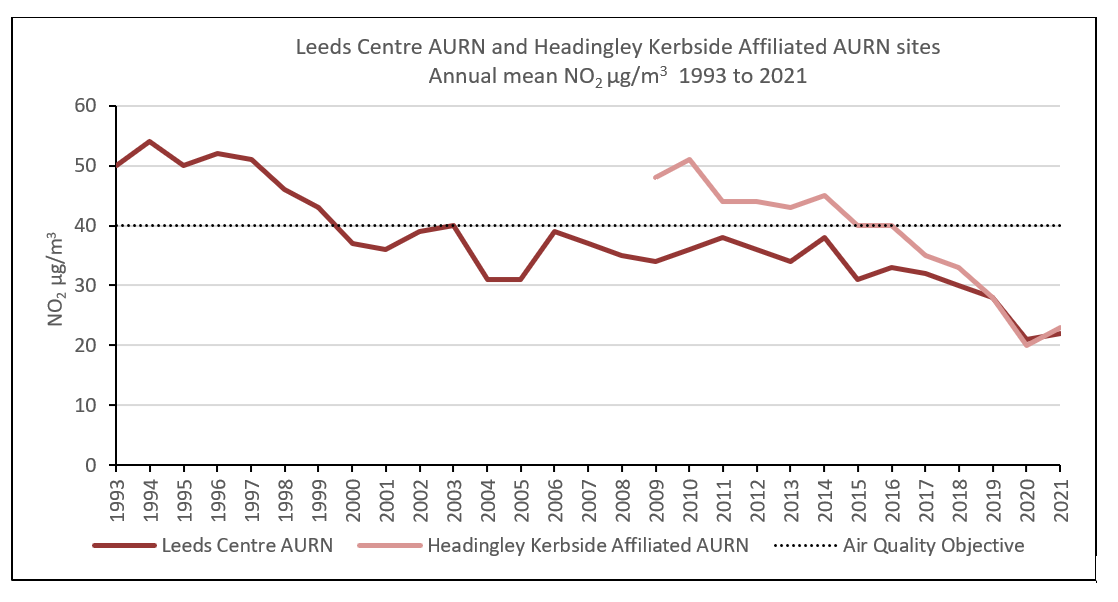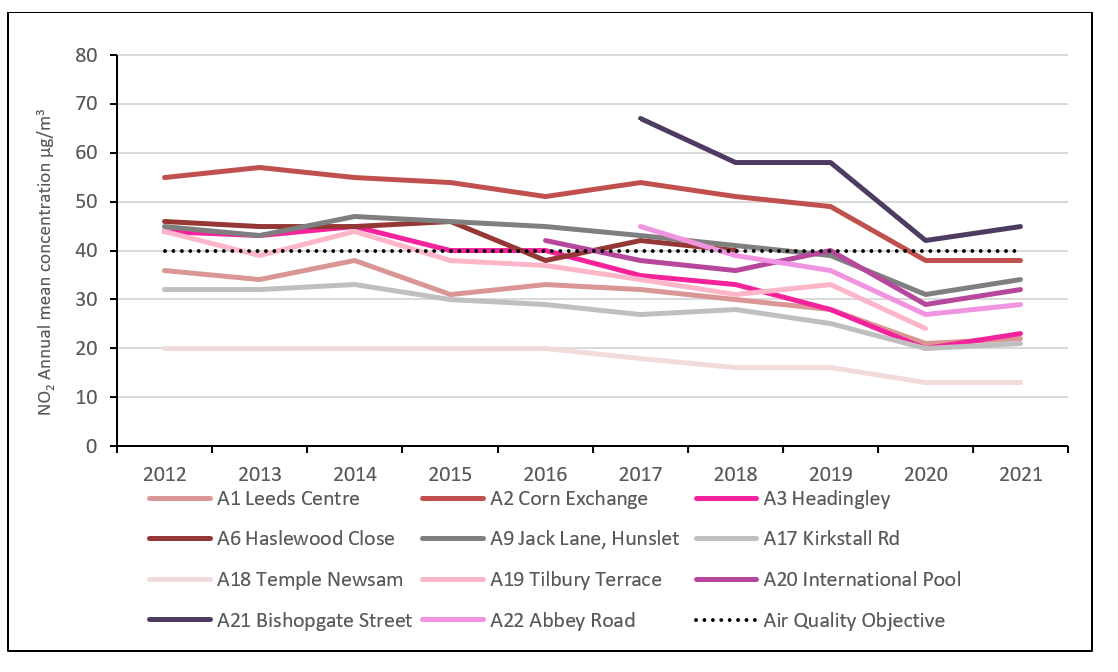
Levels of air pollution in Leeds have not returned to pre-pandemic levels and continue their long-term decline as a result of citywide action, new air quality data published by Leeds City Council on Clean Air Day (16 June 2023) confirms.
Changing travel behaviours, a faster than average transition to plug-in vehicles, and major highways improvements are all likely to have contributed to the city’s healthier air.
However, despite the recent improvements, air pollution is still linked to an estimated 54 of every 1,000 deaths in Leeds.
The new data covering 2021 provides the most recent comprehensive overview of air quality in Leeds available, due to a rigorous verification process. 2022 data will be completed and published later this year.
Leeds City Council approved new targets to improve air quality further and faster than required by national government in 2021 as part of a wide-ranging strategy to reduce air pollution from transport, homes, industry, and agriculture.
Six years ago, Leeds was one of several cities directed by the UK Government to introduce a charging Clean Air Zone to tackle illegal levels of pollution. The policy—combined with almost £8 million of financial support given to businesses—led to an accelerated take up of cleaner vehicles over a four-year period.
The plans to introduce charges in Leeds were ultimately discontinued after the majority of the city’s taxis, buses, coaches, HGVs, and private hire vehicles switched to less polluting models, leading to significant air quality improvements.
Only a small number of air quality monitors in the city centre and near Kirkstall Road measured pollution levels (NO2) higher than permitted by national regulations in 2021 across the entire Leeds district. All but one of these locations are places where people are unlikely to dwell, limiting the health risks. Air quality at many of these locations is expected to improve following current or planned highways works.
Each of the city’s six designated Air Quality Management Areas (AQMAs), including the Tilburys in Holbeck — neighbourhoods previously identified as being unlikely to meet clean air standards — are now compliant with national regulations and continue to improve.
As a result, Leeds City Council has announced today that it plans to formally revoke five of the six AQMA designations this year. The council will keep the AQMA at Pool-in-Wharfedale under review for at least another year to be sure that recent improvements are permanent.
Councillor Mohammed Rafique, Leeds City Council’s executive member with responsibility for climate and air quality, said:
“It is hugely reassuring to see this new data, which confirms that Leeds’ air quality hasn’t returned to pre-pandemic levels and is continuing to get better.
“I am proud of the truly citywide effort that has made this progress possible. It is quite literally helping to save lives and making Leeds a healthier, better place to live.
“Despite these improvements, 54 in 1000 deaths in Leeds can still be linked to air unhealthy air, so it is vitally important that we continue taking further action to bring down pollution levels even more. This council will lead by example to do just that.”
Over the last year, Leeds City Council has progressed a number of major schemes to tackle pollution from homes, transport, and businesses as part of its Air Quality Strategy Action Plan.
Work to transform Leeds City Square is now entering its final stages, providing a safer and more attractive environment for pedestrians and cyclists to travel around the area. Combined with the ongoing works around Leeds City Rail Station, the improvements will reduce pollution and create a more impressive welcome for those arriving by train. The construction is part of the council’s ambitious plans to better connect Leeds, enable more sustainable transport options, and improve travel for all.
Relatedly, a new public electric bike docked hire scheme is being prepared to launch in the coming months and will make cycling easier, convenient, and more accessible for many—giving residents a fun and pollution-free new way to get around. The initiative will see e-bikes available to hire at docking stations in the city centre and along key routes before expanding to other areas.
Leeds also has twelve operational School Streets where access is restricted during specific hours to create spaces which make it easier and more enjoyable to walk, cycle or scoot to school. The council plans to launch up to five more from September. Results from an evaluation of the existing School Streets show that walking and cycling have increased as a result and local parents feel that the roads are safer and feel less polluted as a result.
Local businesses have also been encouraged to give electric bikes a go this year as part of the council’s ‘try-before-you-buy’ e-cargo bike loan scheme that is still open to enterprises looking for sustainable delivery solutions. As well as being greener and cleaner to use, electric cargo bikes can deliver financial savings of up to 90% compared to the cost of operating an equivalent commercial vehicle thanks to their lack of tax, MOT, fuel, and parking costs.
Plans to reduce emissions from heating were set out by the council in March as part of its Net Zero Homes Plan alongside £17 million of new funding from a range of sources. More information about a new scheme to provide low incomes homeowners and private landlords with free or subsidised green upgrades, helping to reduce pollution from solid fuels, are to be published in the autumn.
Councillor Helen Hayden, Leeds City Council’s Executive Member for Sustainable Development and Infrastructure, said:
“Every day should be a Clean Air Day and that is why this council is working alongside our partners to do everything we can to progress our air quality action plan as quickly as possible.
“We’ve seen an incredible amount of work taking place over the last year to improve transport and make Leeds a city where you don’t need to own a car to get around and this vision is key to delivering the aims of our Leeds Air Quality Strategy.”
Breathing polluted air affects our health, reduces our life expectancy, and costs our society billions of pounds each year, according to the UK Health Security Agency.
However, some people are at greater risk than others including children, older people, those who are pregnant, and people with existing medical conditions—especially those relating to the heart or lungs.
For these reasons Leeds City Council also pledged to raise awareness of the impact of air pollution on health as part of its Air Quality Strategy and committed to working with the health and social care sector to help residents protect themselves.
Since Clean Air Day 2022, the local authority has launched a pollution email alert service, hosted an accredited online conference attended by 150 medical professionals, and has surveyed more than 700 residents as part of a new ‘Health Needs Assessment’ research project.
The research revealed that almost 90% of respondents who reported as having been diagnosed with a lung or heart condition say they have never had a conversation about air pollution with a healthcare professional, despite being at considerably greater risk of harm.
The research identified the need to engage with health and social professionals through training, to raise the profile of indoor air quality as an important consideration for health, and to reduce health inequalities for those most at risk.
Councillor Salma Arif, Leeds City Council’s Executive Member for Adult Social Care, Public Health and Active Lifestyles, said:
“I am really pleased to see the council and health partners continue to work together to raise awareness of air pollution and how people can protect themselves.
“Polluted air harms everyone, but some people are at a greater risk. Our latest research suggests that many of the people most vulnerable to the health risks of air pollution in Leeds may not even know it—emphasising the need for this work.
“It’s vitally important that we help those vulnerable people to be fully informed about this risk and understand what they can do about it. Alongside efforts to tackle the sources of pollution, we know that doing this will make a real difference.”
This post is based on a press release issued by Leeds City Council
Whilst you’re here, can we ask a favour?
South Leeds Life is published by a not-for-profit social enterprise. We keep our costs as low as possible but we’ve been hit by increases in the print costs for our monthly newspaper – up 83% in the last 12 months.
Could you help support local community news by making a one off donation, or even better taking out a supporters subscription?
Donate here, or sign up for a subscription at bit.ly/SLLsubscribe




